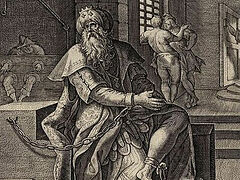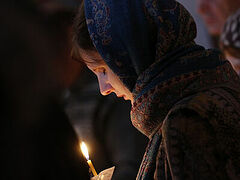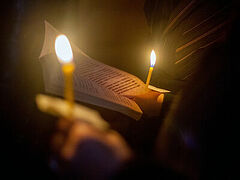Eighth Ode
The marvelous deeds of Elijah are lauded in the beginning of the Eighth Ode. Elijah once ascended above all earthly things in the chariot of his virtues as if to Heaven. Meditate, then O my soul, on this ascent. While Israel had succumbed to paganism, only Elijah dared ascend beyond the circumstances of the time, and this feat led to his fiery ascent to heaven by a noetic chariot. Let us pray and consider if we, too, in this time of general apostasy and lukewarm faith have ascended above the ideological and philosophical and worldly tides. Many of us prefer silence and a “let’s keep the peace” attitude. As we shall see in the case of the Prophet Jeremiah, many false prophets roamed Israel proclaiming a false peace! Let us consider, however: was this the attitude of the Prophet Elijah to the severe crisis moral and theological Israel faced in his era? The Prophet was hounded from cave to cave and crevice to crevice by the workers of iniquity. Here, my mind travels to the Greeks of today who adore the Prophet Elijah and build churches in his honor—yet abroad, as concerns the faith of our fathers in comparison to the works of the Constantinople Patriarchate—how silent they are! Would the Prophet Elijah approve of such a silent, compromising position? Would he, as concerns the priests of Baal, dare to be caught in a position of guilt by association? When Elijah was an outlaw due to his zeal for God’s law, only the Shunammite woman graciously gave shelter to the righteous man. Have we imitated the Shunammite woman’s valor and bravery? Far from us to be as Gehazi, Elisha’s servant, who, though a beholder of the wonders and miracles of the Lord became himself a predecessor of Judas by slyly demanding payment from Neman the Syrian, falsely, on Elisha’s behalf.
Like Uzziah the King of Judah who claimed for himself priestly prerogatives and was thus stricken down with leprosy, perhaps we also are ailing with an interior, spiritual leprosy, which manifests itself in bodily ailments. Those who worship Christ find true freedom. And despite any temptations which they may face, they traverse the instability of the times. We must seek the remedy to our spiritual leprosy. Neman sought this from Elisha, and with faith, baptized himself in the Jordan and received healing of his leprosy—as commanded and as promised. And though a gentile, he submitted to the God of Israel and was delivered. Yet we who are children of the God of Israel forsake Him and forsake His law and His commandments. St. Andrew tells himself, the Ninevites, O my soul, repented before God wearing sackcloth and ashes; yet thou hast not imitated them and hast become worse than all who have ever sinned both before and after the Law. We have become worse than Gehazi, and Eli the priest and his sons, and Barlaam the false prophet because we have lived the Truth of Christ revealed in Orthodoxy and have fled from tilling the earth with the plough.
Firmly grasping the plough (the Gospel) let us till the earth (preach the Gospel) to reap an eternal reward. We preach the Gospel by first sanctifying ourselves. And this occurs, for example, when we imitate Jeremiah the Prophet who persevered, though threatened by his fellow kinsmen, by the men of Annathoth who conspired to kill him, and by false prophets such as Hananiah and Pashur. Have we, as Hananiah did, failed to persevere in the minor temptations of life and thus exchanged a wooden yoke for a yoke of iron? Far be it from us to flee from trial and temptation and anguish as did Jonah, when he was called to go against the tides and preach truth to idolatrous Nineveh. Can you partake of the cup of suffering I partake of? asks the Lord. And the Apostles eagerly answered, “We can!”— though, perhaps, not with serious consideration as, in retrospect, they all fled at the hour of trial. It is always difficult to say I will do this or I will do that, I will be faithful until the end, I will never turn back, I will be constant. I am reminded of Christ’s words: Quicken yourselves and pray that ye do not enter into temptation.
How possible it is, that, despite the best of intentions and vows and interior dispositions, the soul flounders at the last minute and is lost? The wise man, said Christ, built his house on the rocks. In this regard, I am reminded of the words of Archbishop Christodoulos of Athens who said, we must look to the castle of our ancestor’s sacrifices. And these spiritual ancestors—the saints—all dwell now in the City which was not made by human hands. They dwell in the City whose maker and creator is God. We journey to the heavenly Kingdom to be united to Christ and to all those whom Christ loves. We need their prayers and intercessions for the journey. Let us build telephone lines to them in the heart so their prayers may shelter us and strengthen us when we face temptations so that we may not endure the trial alone. Daniel and the Three Youths were also surrounded by temptation in Babylon. Yet these willingly offered themselves as a living burnt offering, and, through them, the mighty power of God was made manifest. It is the meek that inherit the earth. With meekness let us cry as did the Canaanite woman, have mercy on me Son of David! Convicted of our sins, let us pray we be spared the wrath to come.
When Thou sittest upon Thy throne, O merciful Judge, and revealest Thy dread glory, O what fear there will be then; when the furnace shall burn, and all shall tremble before the majesty of Thy Judgement seat, O Christ!
Ninth Ode
St. Andrew has dedicated the first eight Odes of his Canon, along with the poignant Beatitudes that follow Ode Six, to the various righteous and ungodly figures of the Old Testament. St. Andrew has composed his Great Canon as a mighty sailing ship on which he has sailed us through salvation’s history in the world. Let us keep it before our eyes in watchfulness: I have reviewed for thee, O my soul, Moses’ account of the creation of the world, and then all of the canonical Scripture that tells the story of both the righteous and the wicked. I hear this Great Canon annually, yet I remain headless. I sit there with my book following, yet the words do not resonate! This is why St. Andrew sings: The Law is grown weak, the Gospel unpracticed, and the whole of Scripture is ignored by thee; the Prophets fail and the words of the righteous are useless. It’s time for me to cease being a useless servant. It’s time for me to multiply the talents, to fill the lamp, to work while it is day! Harlots and Publicans, St. Andrew teaches me, heard Christ Jesus and repented. And they along with many other foreigners—foreigners to the Gospel and to the Faith—will come from the east and west, and shall sit down with Abraham, and Isaac, and Jacob, in the kingdom of heaven. And the sons of the kingdom shall be cast out.
This life is a desert. And in this desert, we have as a candle the divine Forerunner, who shows us the way to repentance. St. John the Baptist was an image of fasting and repentance and ascesis. Oh, how Judaea and Samaria ran to the Jordan to receive baptism unto remission of sins and justification. We Christians have not run to the Church which is the living, noetic Jordan, wherein we can obtain a fresh start, strength of soul, fortification of the mind, inspiration, and desire of the Kingdom—if we truly pray and open the heart to salvation. Our Lord fasted forty days in the desert as an example for us—and while I do not doubt that we kept the physical side of the fast from our context’s perspective (fasting originally meant bread and water only)—the more interesting question is, did we circumcise the soul of all carnal and freshly desires? Did we fast a spiritual fast? Oh, if we could imitate the centurion in the Gospel and his steadfast, unwavering faith! Lord, say the word… Could we utter these few words with profound faith? St. Andrew writes that Christ appeared to the Samaritan woman and taught thee, O my soul, how to worship in the spirit. Oh, that we would become true worshipers of the Father who live our beautiful sacramental life not for the sake of ritual, but for the sake of sanctification and deification!
St. Andrew concludes the Great Canon by narrating to us about various figures mentioned in the Gospels who encountered Christ, and though, they were dead—dead in sin, dead in illness, and sometimes, literally dead—they became alive. These are resurrected persons. This is the summit and epitome of the Christian life: resurrection and immortality. This is what the Paschal feast is about: that on the Cross and through death and descent into the grave and Hades, Jesus has overcome the boundaries of death. Now, the limits of mankind are in the Heavens. Recently, we celebrated the sixtieth anniversary of Gagarin’s space flight on which he became the first man in space. And truly, from a scientific point of view, this is a marvelous achievement for the Russian people and also for Orthodoxy—Gagarin himself being a piously devout Orthodox Christian and a faithful member of the Orthodox Church. This is something we Orthodox Christians can truly boast about! Yet while this is a historic anniversary, how much more resplendent than this are those men and women of the Gospel on whose lives Christ made an impact and who went on in newness of life, resurrected and transfigured? The women with the issue of blood, the blind man, the one thankful leper from the nine, the paralytic, the harlot who poured the myrrh before Christ’s Passion, Jarius’s daughter raised from the dead, the thief who in deep repentance confessed Christ and said, In Thy Kingdom, Lord, remember me! These people achieved eternal life and an everlasting reward, and inherited the Kingdom prepared before the world’s foundations. Come, then, using St. Andrew’s Great Canon as a navigational map and having attained from it the great lessons meant to fortify the soul, let us with all humility, love and repentance enter into the Mystery of Christ’s Crucifixion, Holy Passions, and Triumphant Resurrection from the Dead.





